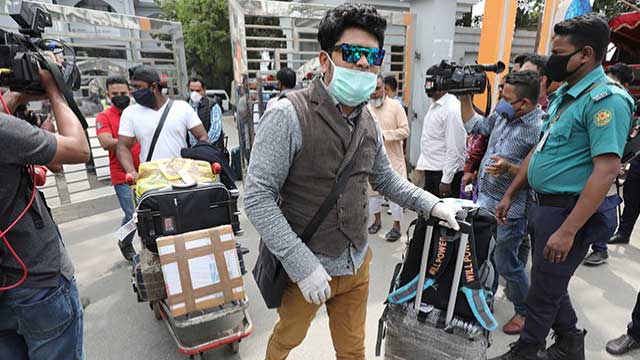Daily, over 2,200 Bangladeshi migrant workers returned home jobless from different countries on an average last week as the pandemic continues to weaken the global economy that might badly affect the country’s remittance earning, the main pillar of the economy, said researchers.
In the last six and half months, 209,345 workers have returned mostly from Saudi Arabia, United Arab Emirates, Qatar and Oman, according the expatriates’ welfare ministry statistics updated on October 18.
Remittance inflow to the country would be reduced as the number of migrant workers in recipient countries has been in decline and their earning continued falling, said former Bangladesh Bank governor Salehuddin Ahmed.
He said that remittance inflow was still high as many migrants sent all of their savings after predicting an uncertain future even before their return.
Some sent their savings due to emergency needs in the families at home as family earning saw a decline due to the coronavirus outbreak and to take advantage of the 2 per cent incentive against remittance announced by the government, he said and added that the current inflow would not sustain.
According to the Bureau of Manpower, Employment and Training only 287 migrants left the country for overseas jobs during the pandemic, which is insignificant in the estimation of manpower experts.
BMET director general Shamsul Alam told New Age that daily 3,000 migrants used to leave for 173 destination countries but the coronavirus crisis dealt a blow to labour migration.
‘Last year we had sent 700,159 migrants but this year the number is only one lakh while the number of returnees is very high,’ he said.
He hoped that in the wake of the COVID-19-induced health crisis the government would search for markets and trained migrants according to the demand of the countries.
Dhaka University professor and funding chairman of Refugee and Migratory Movements Research Unit Tasneem Siddiqui said that the country’s labour migration was in deep crisis as a huge number of workers returned die to the coronavirus crisis while migration to destination countries remained almost suspended.
Although remittance increased amid the crisis due to government subsidies and the reduction in illegal money transfer, but this was not a real increase in remittance inflow, she argued.
Manpower experts feared that many more migrants might return home as they have lost their jobs or are underpaid during the COVID-19 crisis.
They said that the return of a huge number of migrants and the outflow of an insignificant number of new migrants were both alarming as usually 50,000 migrants used to leave the country every month mostly for the gulf and East Asian countries.
They suggested that the government should be more active in exploring new labour markets across the world in addition to the countries that traditionally served as destinations of Bangladeshi migrants.
Probashi Kollayan Desk reported that so far 209, 245 migrants have returned between April 1 and October 18, including 22,936 female migrants.
According to the statistics highest 9,081 women migrants from the KSA and 4,313 women migrants have returned from the UAE.
The inflow of returnee migrants might hit the economy hard if the government do not take immediate actions to mitigate the problems of the migrants who lost jobs or are now underpaid in the destination countries, said Ovibashi Karmi Unnayan Programme chairman Shakirul Islam.
He said that in a recent study they found that two-third workers were infected and 47 per cent of them were unwilling to come back to Bangladesh dreading further sufferings.
‘We must talk to the governments of the destination countries and send assistance so that the workers would be able to survive until the situation turns normal,’ he said.
Shariful Hasan, migration programme head of BRAC, the largest NGO of the world, said that over four lakh aspirants could not go abroad and an additional one lakh got stranded in Bangladesh after they had come on holidays.
He said that annually seven to eight lakh Bangladeshi migrants leave the country after securing overseas employment which came to a halt due the pandemic while many migrants lost their jobs during the health crisis.
Many Bangladeshi migrants in the Kingdom of Saudi Arabia, who came to to Bangladesh on vacations and got trapped couldn’t manage to travel back to their workplaces due to the lack of air tickets.
Moreover, employers in many countries also deducted wage of many workers and many remained in financial crisis.
‘Diplomatic measures, collective reintegration initiative are must to overcome the situation,’ Shariful Hasan said.
The Expatriates’ Welfare and Overseas Employment officials said that a large number of Bangladeshi migrants became jobless in Saudi Arabia, UAE, Kuwait, Oman, Bahrain and Maldives due to the economic rescission.
Besides, many Bangladeshi migrants in European countries became jobless due to the coronavirus outbreak, they said.
According to the BMET over 1.20 crore Bangladeshi migrants are working in 170 countries and they send about $16 billion remittance annually.
Of them, about 80 per cent were employed in the gulf and East Asian countries, said BMET officials.-New Age





